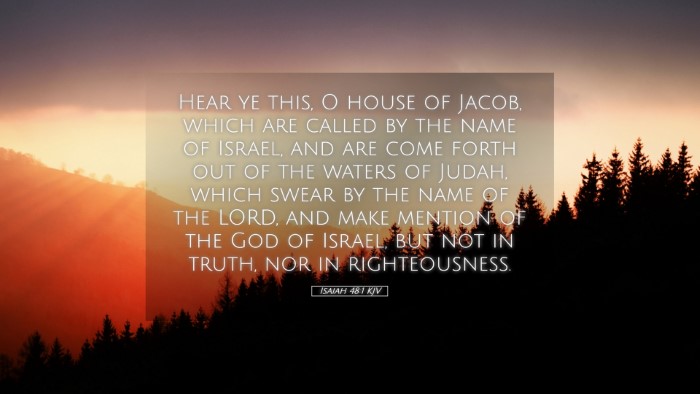Commentary on Isaiah 48:1
Verse: "Hear ye this, O house of Jacob, which are called by the name of Israel, and are come forth out of the waters of Judah, which swear by the name of the Lord, and make mention of the God of Israel, but not in truth, nor in righteousness."
Introduction
Isaiah 48:1 presents a compelling call to the people of Israel, emphasizing their identity and inconsistency in their relationship with God. This verse serves as an introduction to a greater discourse surrounding repentance, the sovereignty of God, and the futility of relying on human wisdom in opposition to divine wisdom.
Contextual Background
The context of Isaiah 48 is crucial for understanding this verse. The prophet Isaiah writes during a time when Israel is facing impending judgment due to their persistent idolatry and rebellion against God. The people are exhorted to remember their true identity as God’s chosen people and to recognize their failure to live in accordance with that identity.
Commentary Insights
1. Identity and Calling
The phrase "house of Jacob" invites reflection on the heritage of Israel and its patriarchs. Matthew Henry emphasizes this calling as a reminder of Israel's unique relationship with God. The term "called by the name of Israel" not only signifies individual and collective identity but also the responsibilities that accompany such a calling.
2. Origin of the People
The expression "come forth out of the waters of Judah" signifies more than geographical origin; it metaphorically denotes their deliverance and the covenant relationship established by God. Albert Barnes points out that this phrase recalls the exodus when God brought His people through the waters, establishing their identity and purpose.
3. The Nature of Their Oaths
Isaiah continues with the acknowledgment that these people "swear by the name of the Lord." However, the prophet reveals a stark reality: their declarations are not matched by genuine faith or righteousness. Adam Clarke notes that this inconsistency points to a superficial faith—a practice of lip service rather than true adherence to God’s commands.
4. Truth and Righteousness
The concluding phrase "but not in truth, nor in righteousness" serves as a poignant indictment of the people’s spiritual state. Matthew Henry uses this to illustrate God’s expectation for believers to embody truth and righteousness in their community. This emphasis resonates throughout Scripture, underscoring the importance of integrity in worship and daily life.
Theological Implications
The implications of Isaiah 48:1 extend beyond the historical context, speaking to contemporary issues within the church and individual believers. The call to heed God's message challenges leaders and laypersons alike to reflect on their own fidelity to God.
1. The Importance of Authentic Faith
Just as Israel was called to recognize their heritage and the need for authenticity, so too are modern believers encouraged to examine the integrity of their faith. Albert Barnes draws parallels between Israel's situation and the church today, inviting self-examination regarding how Christians live out their oaths to God.
2. Divine Sovereignty vs. Human Efforts
At the heart of Isaiah’s message is the sovereignty of God in contrast to human efforts and declarations. The people were inclined to rely on their own understanding rather than submitting to God's truth. This resonates with the teachings of Adam Clarke, who warns against the futility of human wisdom that does not align with divine revelation.
Practical Applications
The message of Isaiah 48:1 offers several practical applications for pastors, theologians, and scholars:
- Encouragement to Authenticity: Churches today are called to strive for authenticity in their faith community, promoting genuine discipleship over mere ritualistic practices.
- Reflection on Identity: Believers must continually remember their identity as God’s chosen people and what that covenantal relationship entails.
- The Role of True Worship: Worship must stem from truth and righteousness, urging a heartfelt connection with God rather than superficial displays.
Conclusion
Isaiah 48:1 serves as a reminder of the complexities of faith and the necessity for a genuine relationship with God. Both historically and in the contemporary church, believers are summoned to hear God’s voice, acknowledge their identity, and commit to living out their faith in truth and righteousness. As seen through the insights of Matthew Henry, Albert Barnes, and Adam Clarke, this call remains as urgent today as it was in the time of the prophet Isaiah.


